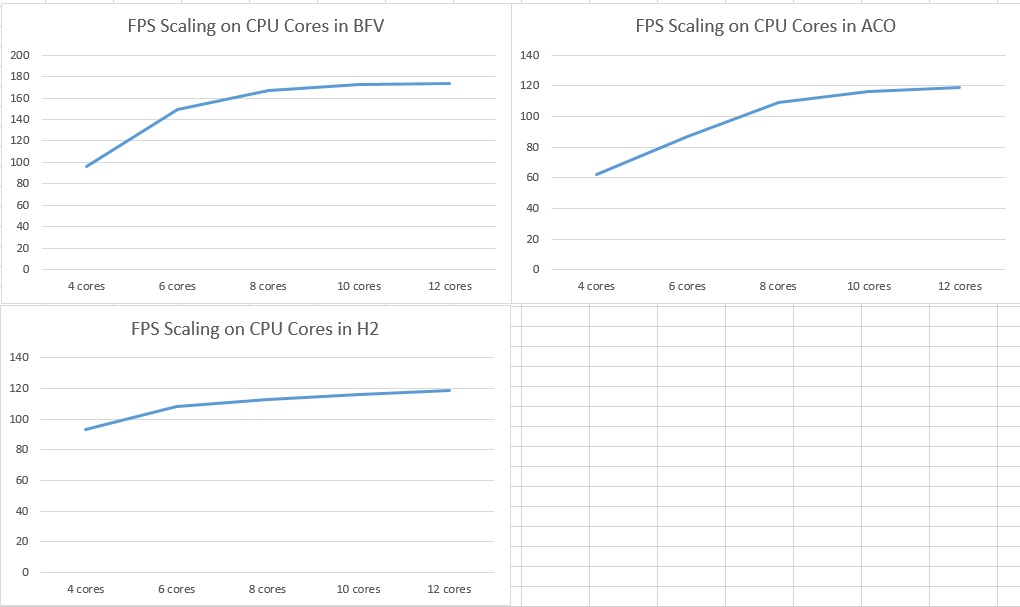@humbug... 32 threads is not enough, More are required. Can I get my sweets now for the right answer.
Buy a CPU and you can have some Haribo.
Please remember that any mention of competitors, hinting at competitors or offering to provide details of competitors will result in an account suspension. The full rules can be found under the 'Terms and Rules' link in the bottom right corner of your screen. Just don't mention competitors in any way, shape or form and you'll be OK.
@humbug... 32 threads is not enough, More are required. Can I get my sweets now for the right answer.
Buy a CPU and you can have some Haribo.

No, 6 cores 12 threads is fine right now, i think higher core counts will get increasingly applicable to games but it will take time.
I have a 32 thread CPU... Didnt get Haribo! did buy a Sata cable, got haribo!
6/12 over an 8/8?
One of the age old questions.
So again, how many?
Testing Games just made a pretty handy little video that could help answer that.
He ran 5 games with an RTX 2080, so high end GPU, with 6 to 12 core CPU's with SMT off.
His results.
BFV:
4 cores: 96 FPS
6 cores: 149 FPS
8 cores: 167 FPS
10 Cores: 173 FPS
12 cores: 174 FPS
Rainbow Six:
4 cores: 269 FPS
6 cores: 315 FPS
8 cores: 329 FPS
10 Cores: 334 FPS
12 cores: 337 FPS
Assassin's Creed Odyssey
4 cores: 62 FPS
6 cores: 87 FPS
8 cores: 109 FPS
10 Cores: 116 FPS
12 cores: 119 FPS
HITMAN 2
4 cores: 93 FPS
6 cores: 108 FPS
8 cores: 113 FPS
10 Cores: 116 FPS
12 cores: 119 FPS
The Witcher 3
4 cores: 101 FPS
6 cores: 137 FPS
8 cores: 151 FPS
10 Cores: 154 FPS
12 cores: 158 FPS
As you can see in 4 out of 5 games there the RTX 2080 doesn't get to stretch its legs until 8 real cores are on the chip, i say 8 real core because 4 core 8 thread is very different to 8 cores 8 thread, on Intel Hyperthreading gains you about 25%, on AMD SMT gains you about 35%.
This is why i think for mid range a 6 core 12 thread CPU is needed, 8700K or 3600/X it really doesn't matter which they are the same performance.
Ok, what is the actual performance difference in real numbers between 6 cores with SMT enabled and 12 cores with SMT disabled?
What is the difference between 8 cores with SMT disabled and 4 cores with SMT enabled?
Ok, what is the actual performance difference in real numbers between 6 cores with SMT enabled and 12 cores with SMT disabled?
What is the difference between 8 cores with SMT disabled and 4 cores with SMT enabled?
I would think nothing.
If it was nothing, your whole thread makes no sense.
@humbug, I don't understand where your reasoning comes from for that?
There is a "something" difference between 4c/8t and 8c/8t but a "nothing" between 6c/12t and 12c/12t?
Do processor physics change after 4 cores?
Read the edit. With you, so the "new" quad core is now a hex core.
@humbug, I don't understand where your reasoning comes from for that?
There is a "something" difference between 4c/8t and 8c/8t but a "nothing" between 6c/12t and 12c/12t?
Do processor physics change after 4 cores?
I’m going to change my answer. If your after maintaining max frames and also reducing micro stutter i.e maxing those 0.1% frame times then I can only recommend a 9900k, yes the 3700x is decent but the ‘edge’ the intel has will really help in this ‘top end’ scenarioIt is game dependant but that doesn't necessarily mean the type of game you think it does.
I play a lot of older games and Indy games, with friend they are just much more fun than Battlefield.
i'll give you an example, Insurgency, 2014, built on Source Engine, same Engine as CS:GO but this game is more graphically involved, still a very high FPS game and my 4.5Ghz 4690K couldn't get on with it when using the GPU you see in my signature, hugely powerful GPU for that game.
As a result even at 4K it would lock the CPU to 100% whenever the draw distance was anything more than 50 feet, resulting in horrible micro-stutter, at 1440P or 1080P that was so bad it was unplayable, the Ryzen 1600 made that go away completely.
I made a recording of the problem here, as difficult as micro-stutter is to see, but you can see the CPU jump to 100% in places, watch the gun when loading, see it stutter.... that the most obvious visual thing of it.
And some times the difference is so high its not even funny.



A 4 core 8 thread CPU is not an 8 core CPU, there is a huge performance difference between an SMT thread and a real core, i explained this in the OP.
Edit: beyond 6 core 12 thread right now the GPU is not bottlenecked, so a higher core count CPU makes no difference.

I’m going to change my answer. If your after maintaining max frames and also reducing micro stutter i.e maxing those 0.1% frame times then I can only recommend a 9900k, yes the 3700x is decent but the ‘edge’ the intel has will really help in this ‘top end’ scenario
I’m going to change my answer. If your after maintaining max frames and also reducing micro stutter i.e maxing those 0.1% frame times then I can only recommend a 9900k, yes the 3700x is decent but the ‘edge’ the intel has will really help in this ‘top end’ scenario

